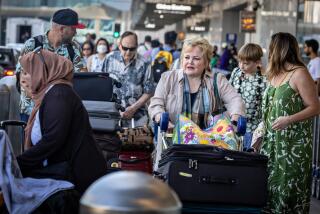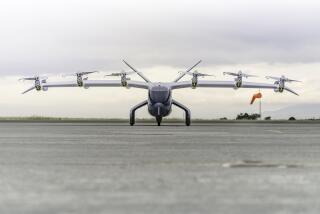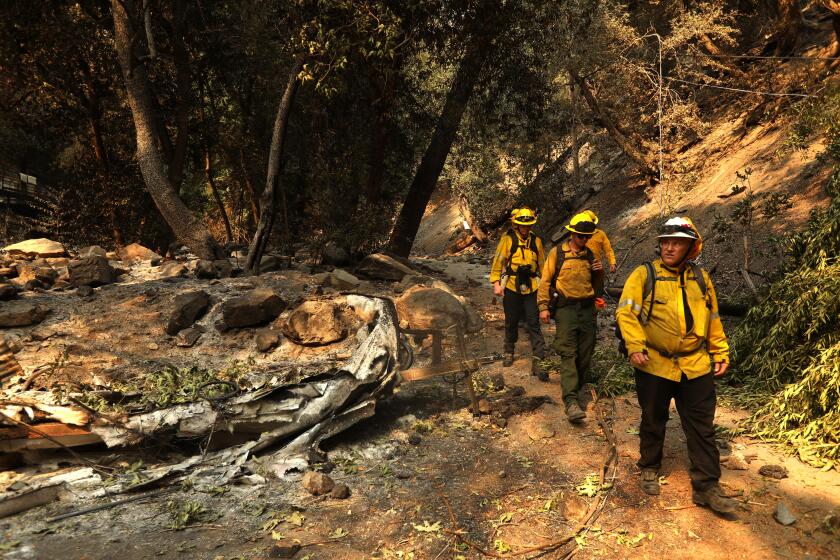Air-passenger rights bills are still on the taxiway
The last nine months have brought a flurry of anger and activism involving fliers trapped on tarmacs with limited food and water and inoperable toilets.
In well-publicized incidents in December and February, passengers said they languished for nine hours or more on American Airlines and JetBlue planes, respectively, during bad weather. One of them, Kate Hanni of Napa Valley, Calif., launched a consumer coalition that already claims more than 16,000 members.
At least four pieces of passenger-rights legislation are pending in Congress. Unwilling to wait, New York forged ahead this month, becoming the first state to enact a law requiring adequate food, water and sanitation during ground delays.
Can legislative relief for captives of the taxiway be far behind?
Well, yes, it could, if you judge by history. Eight years ago, after hundreds of hapless fliers huddled for hours inside Northwest Airlines jets during snowstorms, passenger-rights bills flew across Capitol Hill desks like paper airplanes.
In the end, none of the bills became law, and Congress settled for promises from the airlines to improve their service.
Now it seems we’re right back where we were. Or worse.
More than 39,000 flights taxied more than an hour before taking off during the first half of this year, the highest number for the period since the U.S. Department of Transportation began keeping records 12 years ago.
For your inconvenience, you can blame fuller planes, crowded skies, stormy weather and an antiquated air-traffic-control system overseen by the Federal Aviation Administration. You can even blame yourself. After all, few of us choose to fly at midnight, when skies and tarmacs are clearer.
Just don’t blame us, the airlines say. Now, as in 1999, they say they’re doing the best they can, and they don’t want government help.
The lengthy American and JetBlue delays were “egregious,” but such incidents are rare and don’t warrant new laws, said David Castelveter, spokesman for the Air Transport Assn., a Washington-based industry group.
Last year, just 36 flights out of more than 7 million were delayed more than five hours between the gate and liftoff, he said, citing transportation department statistics.
Efforts to regulate these situations are impractical and could have unintended consequences, he added.
For instance, Castelveter said, it isn’t always possible to bring food aboard or safely get passengers off a plane out on the tarmac because the needed vehicles would interfere with taxiway traffic.
The alternative, returning to the gate to let passengers disembark, can cause the jet to lose its place in line for takeoff, causing further delays, he added.
These decisions should be left to the pilot, not the government, Castelveter said.
New York State Assemblyman Michael Gianaris (D-Queens), a co-sponsor of his state’s new passenger bill of rights, was unmoved by these arguments.
Comparing long ground delays to imprisonment, he said it was “disgraceful” for airlines to oppose laws such as New York’s that mandate waste removal, food and water during these incidents.
But opposition is likely. Castelveter said the Air Transport Assn. was “evaluating our options, including our right to a legal challenge.” He said New York’s law, which takes effect Jan. 1, is preempted by a federal act that forbids states to regulate air carriers, a view that Gianaris disputed.
As for congressional action on tarmac delays, Hanni, of the new Coalition for an Airline Passengers’ Bill of Rights, www.flyersrights.com, believes “we’re going to have something,” perhaps by December. But just what is unclear.
House and Senate bills introduced earlier this year would require that airlines provide adequate food, water and other services to passengers during prolonged delays and allow them to deplane after three hours on the tarmac.
But similar provisions in pending FAA reauthorization bills either omit references to deplaning or exempt carriers from the three-hour rule if they file plans to handle lengthy delays. None of the bills has been voted on by the full House or Senate.
Castelveter said airlines were motivated to reduce delays but acknowledged they could do better.
“We’ve got to find ways to dramatically improve service,” he said. “What we’re saying is, ‘Leave it in our hands.’ ”
As I recall, we already tried that.
jane.engle@latimes.com
More to Read
Sign up for The Wild
We’ll help you find the best places to hike, bike and run, as well as the perfect silent spots for meditation and yoga.
You may occasionally receive promotional content from the Los Angeles Times.






